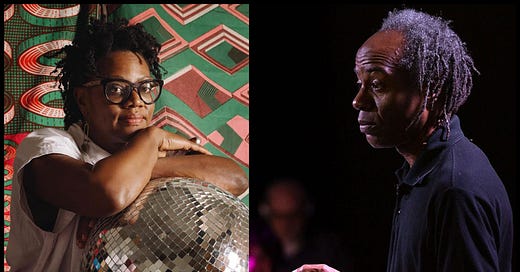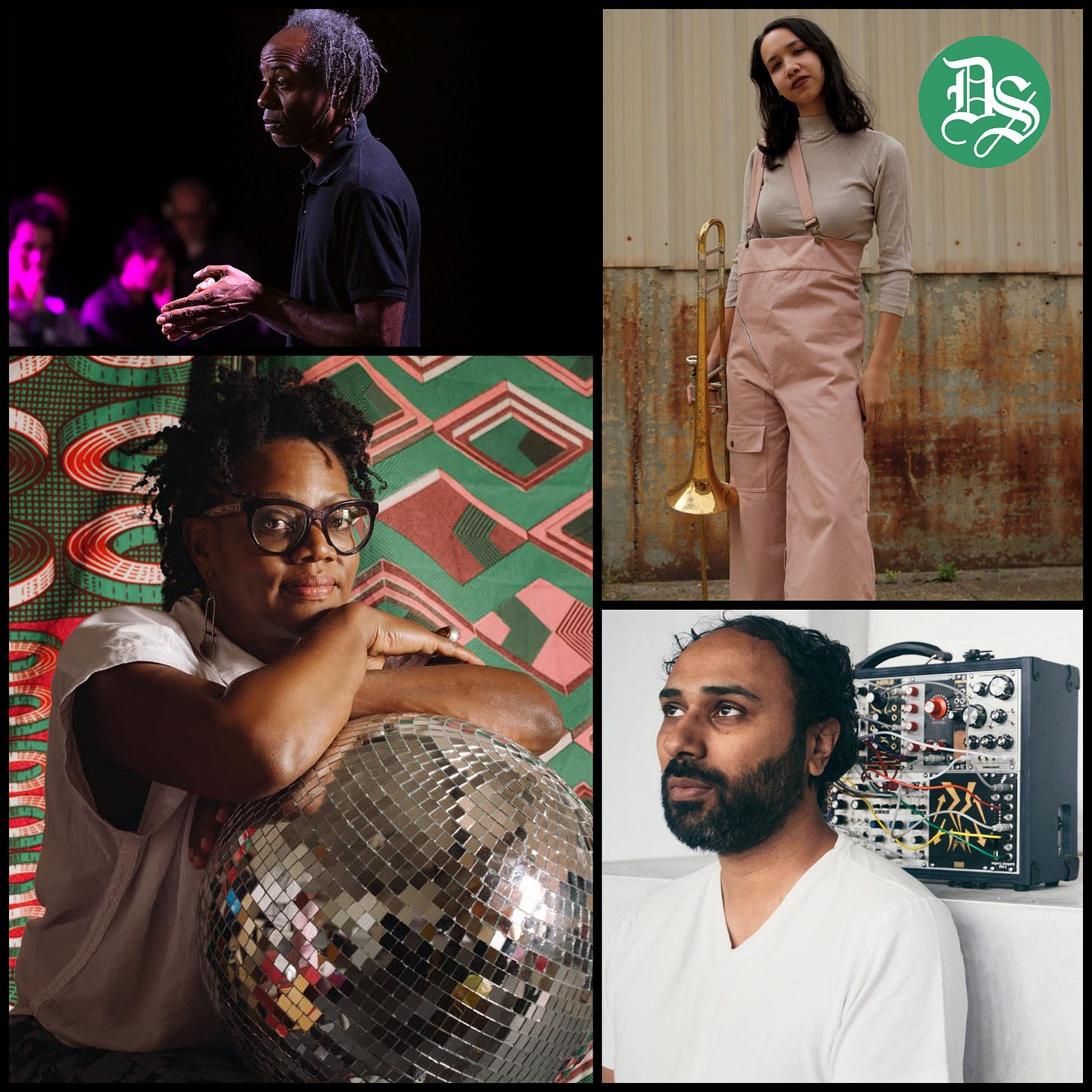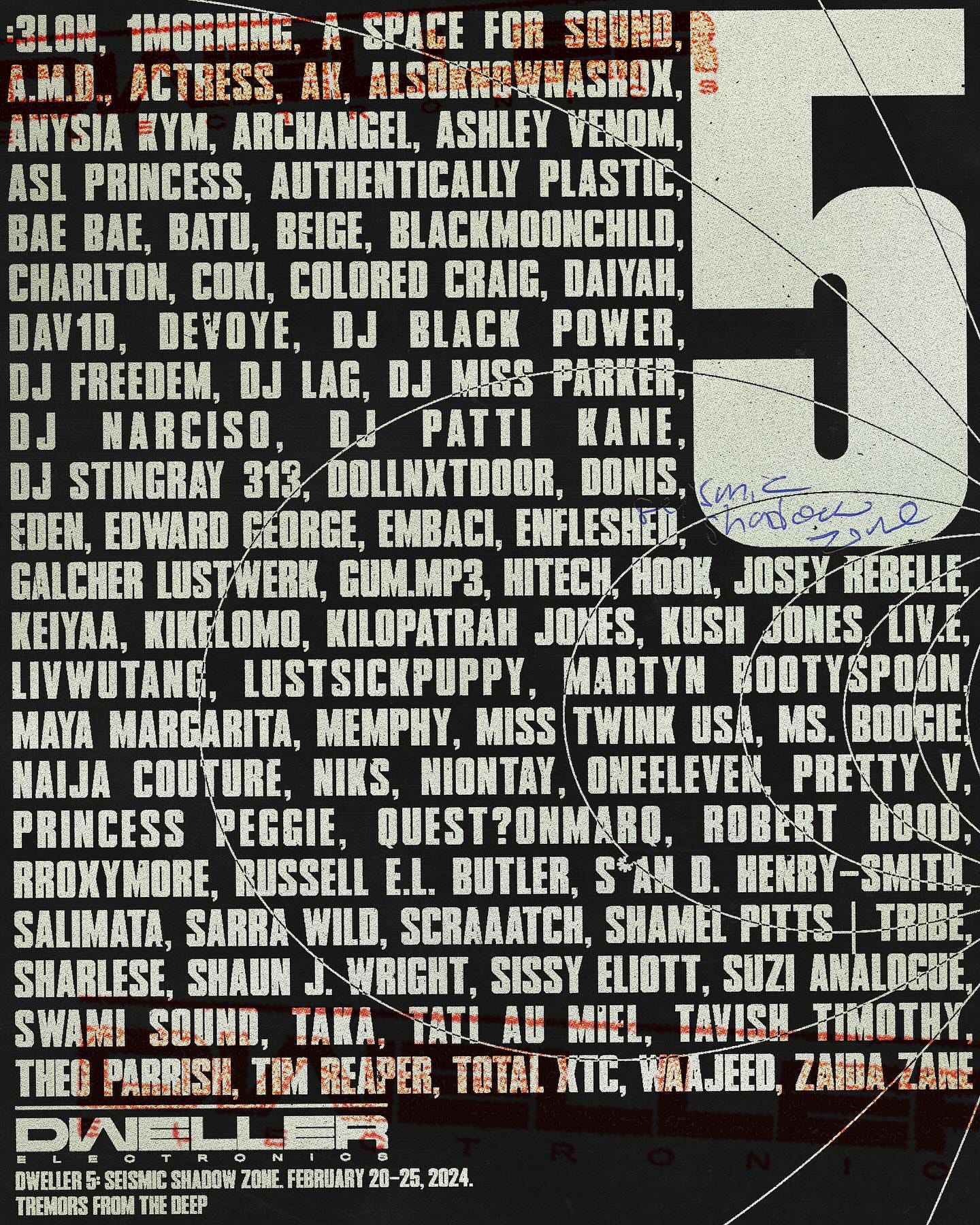In Praise of Dweller | Bklyn Sounds 2/21/2024—2/27/2024
Bklyn's Black electronic dance music festival, founded by/for the community, has been a cornerstone of NYC nightlife renewal + Shows: Kalia Vandever with Rafiq Bhatia & Darian Donovan Thomas / + more
Sometimes a great, culturally significant idea is obvious from the very beginning, no matter how humble its beginnings. And the moment in early 2019 that Discwoman co-founder and then-Bossa Nova Civic Club booker Frankie Hutchinson announced a week of mid-February events at the club would be devoted to Black electronic musicians and DJs, as a mini-festival with a name that invoked a Drexciya album, Dweller seemed immediately notable and long overdue. I edited AFROPUNK at the time, and freelance-employed my friend and occasional colleague, the famed “rhythm analyst” DeForrest Brown, Jr., as a co-conspirator in trying to include more Black dance-music in AP’s punk-centric universe. We instantly decided to cover what was going down at Bossa. (I only went to a single event, a freezing but magical Friday night on which I finally got to experience Ash Lauryn, who I’d already been following via her NTS Underground and Black program, and where I was first introduced to a young DJ named Olive T.)
DeForrest’s ensuing piece, “Decolonizing Techno: Notes From A Brooklyn Dance Floor,” with incredible original images by Brown’s photographer partner, Ting Ding, hit all the notes we inherently knew would be there: the rarity of all-Black bills, the greatness and diversity of the young talent, the creation of a Black space in what was usually mistakenly assumed to be white club culture, and the joy of all the attendees in participating. For those of us fluent in the cultures of New York and Detroit and Chicago, the sounds which emanated from Paradise Garage and The Warehouse and Music Institute (and on and on), there was an obviousness for contemporary Black dance and electronic music culture to have the kind of dedicated space that Dweller promised. So, of course — when the festival took place, the release would be glorious. And once Dweller happened, many would want for it to happen again — and if it was cared for as the cultural rite (and right) it is, it would only get better. Just as it has.
I have covered Dweller, whose fifth edition kicked off on Tuesday, a few times since its inception": writing for AFROPUNK (where I also interviewed Hutchinson right before lockdown), creating a feature for WNYC/Gothamist, previewing last year’s edition in this newsletter, even helping out with an event or two. Each piece worked to define Dweller’s significance in broader culture. But the longer I write Bklyn Sounds and contemplate our arrival at this musicking moment, the more I think of how crucial Dweller has been to setting a tone for this era of New York’s nightlife, and how its presence now constitutes something very unique on the global cultural landscape: An event defined by post-colonial Blackness and history and possibility, but also by the creation of a utopian opportunity for people to participate in that history and future, and the Dweller team’s loving care of this opportunity. To think of Dweller in the framework of “dance-music festival” may not be technically incorrect, but it’s actually bonkers. Dweller is an actualization of “rhythm, improvisation and community futures,” one best version of what can happen — must happen — after the dreaming.
On a purely circumstantial level, Dweller simply arrived at the right place and right time, with the right champion. Hutchinson’s work with women producers/DJs, many of them women of color, and managing bookings at a neighborhood club which was an epicenter of local dance-music vibes, actively welcoming to queer and BIPOC community members and open to deep hedonism, lent that first Dweller an initial space and youthful energy. Knowing and sincere, but also party-oriented and voracious. At Bossa, Frankie could also see and hear the New York dance-music community already in transition, embracing the hyper-local. The Lot Radio and Halfmoon Radio were years into their broadcasts, giving residencies to young DJs, with a higher percentage of women and Black folks than Euro-centric dance-music was accommodating. Local labels like PTP, Haus of ALTR and Towhead were putting on young producers and electronic musicians of numerous sonic stripes. More artists from the art- and fashion-worlds, from intersectional club-nights and private balls, were embracing harder house, techno and futurist electronic sounds into their own work. And a generational historical correction was taking place, with the Black electronic music legacies discovered by those new to the community, and the European idea of “dance music” as entertainment, much less corporate EDM festivals as pleasure, receding as the default gaze. Thank the f*cking God!
The key was how Hutchinson and the Dweller team grew all these different strains, without giving into commercial expectations or exploitations. They put on more and more New York artists (while also looking to classic Black dance-music strongholds in the U.S. and across the Black Atlantic), at more and more Bklyn/city venues (almost exclusively those already producing community events). There’s no doubt in my mind that, in its wake, Dweller’s energy elevated the volume and potentialities of great local sounds and events, diversifying what was already here. I have certainly heard numerous young Black electronic-music-adjacent artists who’ve recently moved to the city cite Dweller as proof that there was a community waiting for them here.
Five years later, even with increased participation by global artists and local cultural institutions, and expansive programming breadth (2024’s Criterion Collection tie-in is genius), Dweller continues to feel like a community thing. One with more ideas than resources, with love in its heart for all, but focused on who it's primarily by and for, the Black and Brown participants of the culture. And it’s incredibly important that it stays that way. As dance-culture’s mass popularity grows to encompass the marginalized communities and the stories long at the music’s center, Dweller’s popularity grows too. And we all know what happens when crowds, no matter how well-meaning but ignorant of community rules, step into spaces where they are being welcomed as visitors. In early February, Dweller’s IG posted a “PSA TO ALL”, asking attendees to check their privileges at the door, and to “please be cognizant of the space you take up in Dweller and how you move through the festival.” I am always afraid that folks read a note like that and say, “I get it - but that doesn’t apply to me.” It applies, brothers and sisters, it applies.
There is so much great stuff at Dweller 2024 — find me at Thursday’s “Strangeness of Dub” program, Friday’s Dubstep jam, Saturday’s conversation between Theo Parrish and Mike Rubin, and, if I have strength left, at Saturday and Sunday’s Nonstop. It is only getting better, and whether you notice or not, it is helping lift the whole of the New York community. And for that I can only say, “Thank You!” (Dweller 5, Feb. 21-25, all around Brooklyn, ticket prices vary)
This Week’s Other Shows:
Dual is the name of a new series that excellent drummer Savannah Harris is curating in the still-percolating back-room at Sisters, that she describes as “fresh stylistic pairings and novel genre cross-pollination.” The kick-off — Harris pairing up with saxophonist Zoh Amba — is certainly a potential event for sonic seismologists; then again, these two are also handy with traditional American melodies. Highly likely as a win-win. Get there early for Aden, a vocalist-songwriter-keyboardist who works with ambient space, melody and global-music textures in beautiful ways that somebody will inevitably soon reduce to “alternative R&B.” (Wed 2/21, 8p @ Sisters, Clinton Hill - $20suggested)
TALK/AUDIO ESSAY: Edward George is a kind of Zelig-type character in the first golden-age of Black techno going global and the Diasporic art-technology it spurred on. Among other work, the British son of Dominican parents was a member of London’s Black Audio Film Collective (he wrote and starred in 1995’s The Last Angel of History, John Akomfrah’s absolutely essential history of Black electronic music), and was a member of the short-lived trio Hallucinator, whose deep dub-techno appeared on Berlin’s legendary Chain Reaction label. George is in town for Dweller (natch!), but he’s also here to impart some wisdom via a DJ’d talk called The Strangeness of Dub, The Strangeness of Jazz, guaranteed to be great. (The event is produced by The Colloquium for Unpopular Culture, which I highly recommend following for alternative perspectives on the historical imagination.) (Thurs 2/22, 12:30p @ Immersion Room, NYU Bobst Library, Washington Square, Manhattan - FREE with RSVP)
Word on the street is that one of my favorite places to engage music, a “secret Bklyn location” at which Dada Strain has produced a number of events, may not be around much longer. All the more reason to support the great work still being done there. That includes the latest Present Sounds deep listening session and its massive double-bill: a new modular-synth piece by Bklyn musicker Qasim Naqvi, maybe still best-known as 1/3 of Dawn of MIDI but who collaborates on many great sounds with many great folks in NYC, and DJ sets by Ivy Meadows (the audio-visual artist, Camilla Padgitt-Coles). Highest Recommendation for the psychedelic wellness heads and ears. (Thurs 2/22, 6p @ secret Bklyn location - $25 w/RSVP)
Keep reading with a 7-day free trial
Subscribe to Dada Strain to keep reading this post and get 7 days of free access to the full post archives.




